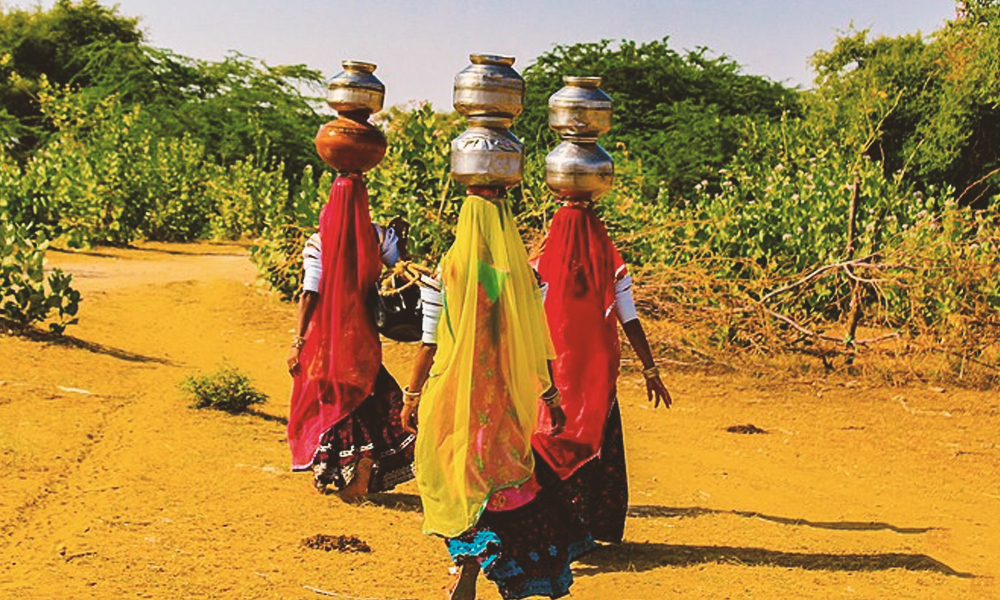
Image Credits: Wikimedia
Jal Sahelis: Reviving Parched Areas In Bundelkhand, Solving Water Woes
Writer: Ankita Singh
A literature lover who likes delving deeper into a wide range of societal issues and expresses her opinions about the same. Keeps looking for best-read recommendations while enjoying her coffee and tea.
Madhya Pradesh, 18 Jan 2021 9:03 AM GMT
Editor : Prateek Gautam |
A free soul who believes that journalism, apart from politics, should stand for social cause and the environment.
Creatives : Abhishek M
" An engineer by profession, Abhishek is the creative producer of the team, graphic designing is his passion and travelling his get away. In more ways than one, he makes the content visually appealing."
In the last four year, the group of women, Jal Saheli, has successfully quenched the thirst of over 100 villages across four Bundelkhand districts.
A group of women in Madhya Pradesh have come together, working tirelessly to mitigate the water issues faced by over 100 villages of perennially parched Bundelkhand region. Known popularly as 'Jal Saheli', the group has now over 750 members.
In the last four year, with their efforts, they have successfully quenched the thirst of over 100 villages across four Bundelkhand districts. For dealing with water woes, over 450 check dams and 56 lakes have been built in these villages.
As per records, Bundelkhand is stated to be one of the most water-deficient regions of UP-Madhya Pradesh.
Drought conditions have been existing in the Bundelkhand region since so long such that it has become a way of life for people to adjust to the conditions. Now, it is a common sight to observe people covering long distances to get water just to quench their thirst.
Under such circumstances, women continue to be the worst hit as they usually shoulder the responsibility of fetching water in most households.
What is Jal Saheli?
Amid the struggles faced by women in this region, a group of them belonging to Lalitpur, a district in Bundelkhand, emerged to form a self-help group known as 'Jal Sahelis' (friends of water).
This self-help group that has been a saviour for many villages was formed with the help of an organisation called Parmarth Samaj Sewa Sansthan.
This Sansthan works with local communities in the area for water conservation. Taking steps to motivate Jal-Saheli group, the Sansthan started organising the women, encouraging them to revive water bodies in their village.
After getting support from the organisation, a lot of women came forward and joined hands to deal with the water scarcity issue in the village. The women from the SHG began repairing the water pumps near their homes.
Recalling her experiences, Gayatri, 40, a Jal Saheli, says, "It wasn't easy, we were not comfortable going out to work; our husbands feared the wrath of society in letting us participate in public events. They were uncomfortable in letting us converse with volunteers who taught us about water conservation," as reported by The New Indian Express.
The women of Lalitpur struggled to manage their household work along with working towards water conservation and they would wake up at dawn to finish off their chores.
"When our husbands left for work and the children were off to school, we'd start our task of repairing the wells near our place," she says.
Sansthan's secretary Dr Sanjay Singh, that supported the Jal Saheli's says that the women were first sensitised about water conservation, groundwater table and the need for repairing work.
For making the women literate about water conservation work, special training programmes were designed by Parmarth Sansthan.
After the training was given to the women, a year later, the Jal Sahelis repaired all the hand-pumps in and around their villages in Lalitpur and even installed a few new ones. For carrying out the work successfully, men also volunteered to support the women.
"It has become a movement…the women volunteers are now active in six districts of the region in both UP and MP. In UP, Jal Sahelis have brought about a sea change in water conservation in Hamirpur, Jaluan, Lalitpur and Jhansi. They have also started working in Chitrakoot," says Dr Sanjay Singh.
Geeta recalls that she joined the Jal Saheli programme four years back. She decided to carry on with the work which she was doing despite all unpleasant comments and restrictions. Geeta proudly says that she has revived five wells in her village Manpur in Jhansi.
All the women in this SHG are divided into groups through which they are trained in water literacy programmes. They build check dams in their respective villages.
Dr Singh shares that in some places, the Jal Sahelis would end up working for 25 days at a stretch, digging acres of existing lakes and converting them into check dams. Also, he shared, that the water which is now available in the village is not just for domestic use, but for irrigation as well.
The impact of the Jal Sahelis is such that in places where farmers would grow only one crop during the maximum availability of water in the year, they have now moved to cultivate three crops. Apart from this, Dr Singh also mentions that with this change in the villages, the farmers' income is rising and migration of youth has even been contained.
Also Read: Bengaluru Startup Makes Eco-Friendly Straws From Fallen Coconut Leaves, Provides Employment To Women
 All section
All section














